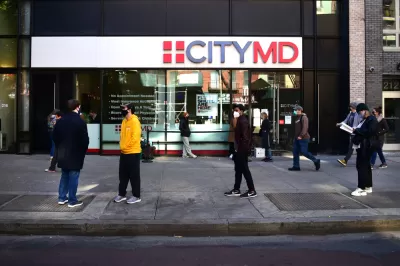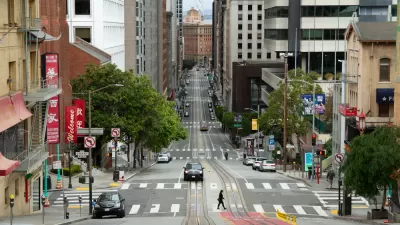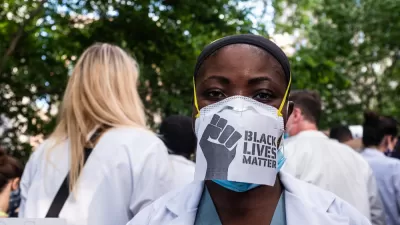The latest in a series of compendia tackling the effects of the pandemic, now and in the future, for cities and communities.

Since March 2020, Planetizen has been tracking the stories that have attempted to make sense of the world during the pandemic, and how the pandemic might alter the future direction of communities. Many of the themes have repeated, with only slight variations as the coronavirus has revealed its effects for public health, the economy, and society.
- Nine Months Later: How the Pandemic Is Changing Communities (December 2020)
- Coronavirus and the Future of Cities: A Final Pre-Election Tour of the Issues (November 2020)
- Do We Know Any More About the Future of Cities Than We Did in April 2020? (October 2010)
- The Media Can't Stop Talking About the End of Cities (August 2020)
- The Great Debate: Will the Pandemic Alter the Course of Urbanism? (July 2020)
- Debating the Future of Cities After the Coronavirus, Volume 3 (June 2020)
- Density Debate Rages Alongside the Pandemic (April 2020)
- Debating the Future of Cities, and Urban Density, After the Pandemic (March 2020)
- Coronavirus and Urbanism (Planetizen Tag)
- Coronavirus and Transportation (Planetizen Tag)
- Coronavirus and Density (Planetizen Tag)
As the calendar year turned, two major themes can be seen in the news. One is the traditional post-mortem on the year in terms related to planning and design. Planetizen recently published two articles with the same purpose: sifting through the news of the year for indications of how the pandemic is changing the world, and how it will continue to do so in the future.
The second theme is the reemergence of density as a fulcrum in the debate about how the novel coronavirus is spreading. For several months, the question of whether density was spreading the coronavirus (cause) took a backseat to analysis and speculation about migration trends during the pandemic (effect)—a theme that might have reemerged because of yet another shift in the geography of the pandemic. Now that Los Angeles and Southern California have become hot zones for the pandemic, density is again assuming a central role in the conversation.
It must also be noted that the new year begins in the worst moments of the pandemic in terms of new infections and deaths. On January 6, the same day that a seditionist mob incited by the President of the United States attacked the Capitol Building in Washington, D.C. and briefly shut down the constitutional duties of the elected bodies to ratify the November 2020 election, more Americans died of COVID-19 in one day that any previous day in the pandemic.
Despite the (heavily criticized) rollout of the vaccine and the approval of a new economic stimulus package by the federal government, the articles below were published in the darkest period of the pandemic so far.
Status Check
- Big box stores top source of COVID-19 spread in El Paso, officials say (KTSM, November 5, 2020)
- The Global Food System Is Also a Victim of Covid (Bloomberg CityLab, December 2, 2020)
- Rent disputes and broken leases: How Philly businesses and landlords are handling the COVID crush (BillyPenn, December 8, 2020)
- Tracking the seasons of pandemic response in Seattle (High Country News, December 9, 2020)
- U.S. Renters Could Owe $70 Billion (Bloomberg CityLab, December 10, 2020)
- Millions of Americans are heading into the holidays unemployed and more than $5,000 behind on rent (The Philadelphia Inquirer, December 13, 2020)
- Did Covid Lockdowns Really Clear the Air? (Bloomberg CityLab, December 21, 2020)
- Congress extends pandemic aid for the jobless and renters. Here’s what you need to know. (The Washington Post, December 21, 2020)
- New York Sees Boost in Latest Covid-19 Aid Package (The Wal Street Journal, December 21, 2020)
- It’s Gonna Go Really Far:’ Colorado Could Get $383M For Renter Aid, But Will It Get To People In Time? (CPR News, December 21, 2021)
- Congress will extend eviction moratorium, fund emergency rent assistance with new stimulus deal (MarketWatch, December 22, 2020)
- Will new coronavirus relief package be enough? Black and Latino landlords could lose big (December 22, 2020)
- If the measure of a city is how it treats its 'invisibles', London should be ashamed (The Guardian, December 24, 2020)
- The Place Hit Hardest by the Virus (The New York Times, December 27, 2020)
- One of America’s Richest Islands Got Pummeled by COVID. Then the Warring Started. (Yahoo News, December 28, 2020)
- Post-Vaccine Vacation Dreamers Plot to ‘Get the Hell Out of Their House’ (The Wall Street Journal, December 30, 2020)
- Six Stories From a Downtown District Show Pandemic’s Uneven Toll (The Wall Street Journal, December 31, 2020)
- When COVID hit, a Colorado county kicked out second-home owners. They hit back. (High Country News, January 1, 2021)
- What the San Francisco Bay Area Can Teach Us About Fighting a Pandemic (The New Yorker, January 4, 2021)
Density Debate
- Are Cities a Safe Place to Live During a Pandemic? (The New York Times, December 7, 2020)
- Op-ed: How density can be the hero in L.A.’s story (The Architect's Newspaper, December 27, 2020)
- L.A. was uniquely vulnerable to this COVID catastrophe. Here is what went wrong (Los Angeles Times, December 28, 2020)
- The case for large cities in a post-pandemic world (Vox, January 4, 2021)
- Los Angeles Mayor Blames COVID Outbreak on Density (Planetizen, January 6, 2021)
2020 Post-Mortem
- The Plague Year (The New Yorker, December 28 4, 2020)
- The pandemic helped transform Toronto streets in an instant. Let that be a lesson for 2021 (Toronto Star, December 28, 2020)
- The Year of the Neighborhood (Slate, December 29, 2020)
- The year shopping changed forever (Vox Recode, December 29, 2020)
- 14 clever COVID-19 design solutions from around the world (Los Angeles Times, December 29, 2020)
- What can we learn from the great WFH experiment? (The Financial Times, December 30, 2020)
Pattern Shift
- The Future of the Central Business District: Resetting Our Downtown Cores (Gensler, November 4, 2020)
- There’s No Room for Teens in the Pandemic City (Bloomberg City, November 30, 2020)
- What Facebook’s empty campus says about the post-Covid world (New Statesman, December 3, 2020)
- Have We Reached Peak Rural? (Worth, December 7, 2020)
- Chinatown Businesses Face a Particularly Brutal Winter (Bloomberg CityLab, December 7, 2020)
- Covid-19, Remote Work Make Austin a Magnet for New Jobs (The Wall Street Journal, December 8, 2020)
- Housing boom in D-FW and nationwide will continue in 2021 (The Dallas Morning News, December 10)
- Will Coronavirus Be the Death of Cities? Not So Fast (The Wall Street Journal, December 10, 2020)
- Street Eats: Welcome to the new normals of outdoor dining (The Architect's Newspaper, December 10, 2020)
- Midtown Is Reeling. Should Its Offices Become Apartments? (The New York Times, December 11, 2020)
- Is this the end of cities in America? (The Hill, December 13, 2020)
- Local Lifeline: An Ode to SF’s Corner Stores (SF Weekly, December 15, 2020)
- Here's where home prices soared the most during the pandemic (Inman, December 15, 2020)
- What Happens When the 1% Go Remote (Bloomberg CityLab, December 16, 2020)
- Denver ranks in top 10 for most moved-to U.S. cities during COVID-19 pandemic (The Denver Post, December 16, 2020)
- The E-Commerce Boom Hits Brooklyn’s Cobblestone Streets (Bloomberg CityLab, December 16, 2020)
- How New Yorkers Want to Change the Streetscape for Good (The New York Times, December 18, 2020)
- Empty Hotels Get Second Life as Tiny Apartments During Pandemic (The Wall Street Journal, December 22, 2020)
- The Covid Recovery Must Begin With Climate Action (December 22, 2020)
- Denver’s shared streets program to continue into the new year, city officials say (December 23, 2020)
- Residents are looking to escape these 10 cities (Inman, December 23, 2020)
- Homeowners aren't fleeing cities in droves despite COVID-19 (Yahoo finance, December 27, 2020)
- California May Lose Some of Its Stars. But Silicon Valley Is Forever. (The New York Times, December 28, 2020)
- Work-at-home will stay in play long after the pandemic recedes (The Denver Post, December 28, 2020)
- Five ways a bad year could better our cityscape (The Boston Globe, December 31, 2020)
- How the Zoom boom is changing the West (High Country News, January 1, 2021)
Coronavirus and Transportation
- Ride Sharing Attitudes Before and During the COVID-19 Pandemic in the United States (Transport Findings, November 26, 2020)
- US public transit systems are facing a threat like never before (City Monitor, December 4, 2020)
- PennDOT delays six projects worth $15.5 million to $28.5 million (Pittsburgh Post-Gazette, December 4)
- The Health Of Public Transportation Systems (NPR, December 7, 2020)
- Analyzing the Recovery of the NYC Subway during COVID-19 (Qri, December 8, 2020)
- U.S. Public Transportation Is Facing A "Make Or Break" Moment (Vice, December 11, 2020)
- Mass Transit Is in Jeopardy—and So Are Cities (Wired, December 14, 2020)
- Public transit in the US is already underfunded. The pandemic has made it worse. (Vox, December 14, 2020)
- Editorial: Transit is in a death spiral. Better service, bus lanes and other smart investments can save it (Los Angeles Times, December 16, 2020)
- Regional transit operators poised to get federal aid, but fiscal worries remain (Politico, December 21, 2021)
- Even with stimulus, US mass transit faces a death spiral (City Monitor, December 21, 2020)
- What will the new COVID stimulus bill mean for Chicagoland transit? (Streetsblog Chicago, December 21, 2020)
- Federal relief bill likely to save Metro from proposed ‘doomsday’ service cuts (The Washington Post, December 21, 2020)
- NYC’s Subway Used to Be for Everyone. What’s Going to Happen Now? (Vice, December 22, 2020)
- More remote work? Even worse traffic? What the post-pandemic future holds for California transportation (The Mercury News, December 27, 2020)
- Will our transportation system support a post-COVID world? (Dallas Morning News, December 28, 2020)
- Requiem for the Super Commuter (Bloomberg CityLab, December 31, 2020)
- Canada’s big-city transit systems say service will be (mostly) back to normal in 2021 — even if ridership isn’t (Toronto Star, January 3, 2020)
- How Does New York Keep Transit Riders Safe From Covid-19? Trial and Error. (The Wall Street Journal, January 3, 2021)
- CDOT kicks COVID stimulus money to projects across state; RTD hopes to reverse some layoffs (The Denver Post, January 5, 2021)
- MBTA service cuts are bad public policy (The Boston Globe, January 5, 2021)

Study: Maui’s Plan to Convert Vacation Rentals to Long-Term Housing Could Cause Nearly $1 Billion Economic Loss
The plan would reduce visitor accommodation by 25,% resulting in 1,900 jobs lost.

North Texas Transit Leaders Tout Benefits of TOD for Growing Region
At a summit focused on transit-oriented development, policymakers discussed how North Texas’ expanded light rail system can serve as a tool for economic growth.

Using Old Oil and Gas Wells for Green Energy Storage
Penn State researchers have found that repurposing abandoned oil and gas wells for geothermal-assisted compressed-air energy storage can boost efficiency, reduce environmental risks, and support clean energy and job transitions.

Private Donations Propel Early Restoration of Palisades Playground
Los Angeles has secured over $1.3 million in private funding to restore the Pacific Palisades playground months ahead of schedule, creating a modern, accessible space that supports community healing after recent wildfires.

From Blight to Benefit: Early Results From California’s Equitable Cleanup Program
The Equitable Community Revitalization Grant (ECRG) program is reshaping brownfield redevelopment by prioritizing projects in low-income and environmental justice communities, emphasizing equity, transparency, and community benefits.

Planting Relief: Tackling Las Vegas Heat One Tree at a Time
Nevada Plants, a Las Vegas-based nonprofit, is combating the city’s extreme urban heat by giving away trees to residents in underserved neighborhoods, promoting shade, sustainability, and community health.
Urban Design for Planners 1: Software Tools
This six-course series explores essential urban design concepts using open source software and equips planners with the tools they need to participate fully in the urban design process.
Planning for Universal Design
Learn the tools for implementing Universal Design in planning regulations.
Ascent Environmental
Borough of Carlisle
Institute for Housing and Urban Development Studies (IHS)
City of Grandview
Harvard GSD Executive Education
Toledo-Lucas County Plan Commissions
Salt Lake City
NYU Wagner Graduate School of Public Service






























